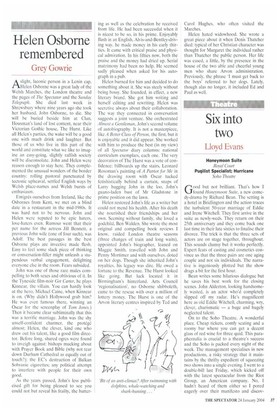Helen Osborne remembered
Grey Gowrie
Aslight, laconic person in a Lenin cap, Helen Osborne was a great lady of the Welsh Marches, the London theatre and the pages of The Spectator and the Sunday Telegraph. She died last week in Shrewsbury where nine years ago she took her husband, John Osborne, to die. She will be buried beside him at Clun, Housman's land of lost content, near their Victorian Gothic house, The Hurst. Like all Helen's parties, the wake will be a good one with much drink and laughter. But those of us who live in this part of the world and constitute what we like to imagine an easy-going. slightly raffish society will be disconsolate. John and Helen were reason enough to stay here. They complemented the unusual wonders of the border country: rolling pastoral punctuated by tectonic upheaval, settled English ways by Welsh place-names and Welsh bursts of enthusiasm.
Emigres ourselves from Ireland, like the Osbornes from Kent, we met on a blind date in a restaurant in the mid-1980s. It was hard not to be nervous. John and Helen were reputed to be epic haters, love-haters even. Rumour went that their pet name for the actress Jill Bennett, a previous John wife (one of four such), was Adolf. The best passages in the best Osborne plays are invective made flesh. Easy to feel some slack piece of thinking or conversation-filler might unleash a stupendous verbal engagement, delighting everyone else in the room. Fears subsided.
John was one of those rare males compelling to both sexes and oblivious of it. In the Tyneside film-noir Get Carter, he plays Kinnear. the villain. You can hardly look at the hero, Michael Caine, when Kinnear is on. (Why didn't Hollywood grab him? He was even famous there, winning an Oscar for the screenplay of Tom Jones.) Then it became clear subliminally that this was a terrific marriage. John was the shy unself-confident charmer, the protégé almost; Helen, the clever, kind one who drew out his talent, like a good film director. Before long, shared ogres were found to inveigh against: bishops mucking about with Prayer Book and Bible (why not tear down Durham Cathedral as equally out of touch?); the EC's destruction of Balkan Sobranie cigarettes; any political attempt to interfere with people for their own good.
As the years passed, John's less publicised gift for being pleased to see you could not but reveal his frailty, the batter
ing as well as the celebration he received from life. He had been successful when it is nicest to be so, in his prime. Enjoyably flash in an English, Alvis-and-Bentley-driving way, he made money in his early thirties. It came with critical praise and physical admiration. In his fifties now, both the praise and the money had dried up. Serial matrimony had been no help. He seemed sadly pleased when asked for his autograph in a pub.
Helen burned for him and decided to do something about it. She was steely without being bossy. She founded, in effect, a new literary brand. She got him writing and herself editing and rewriting. Helen was secretive always about their collaboration. The way they connected in conversation suggests a joint venture. She orchestrated Almost a Gentleman, John's second volume of autobiography. It is not a masterpiece, like A Better Class of Person, the first, but it is enjoyable and it did appear. She worked with him to produce the best (in my view) of all Spectator diary columns: national curriculum exemplars, each one. The very decoration of The Hurst was a vote of confidence: billboards up the stairs, Leonard Rosoman's painting of A Patriot for Me in the drawing room with Oscar tucked fetishistically behind a curtain, snaps of Larry hugging John in the loo, John's guano-laden bust of Mr Gladstone in prime position on the lawn.
Helen restored John's life as a writer but could not mend his health. After his death she nourished their friendships and her own. Seeming without family, she loved a godchild, Ben Walden. She wrote the most original and compelling book reviews I know, raided London theatre seasons (three changes of train and long waits), appointed John's biographer, leaned on Maggie Smith, travelled with John and Penny Mortimer and with ourselves, doted on her dogs. Though she inherited John's royalties, his legacy was dire. He owed a fortune to the Revenue. The Hurst looked like going. But luck located it in Birmingham's hinterland. Arts Council `regionalisation', no Osborne shibboleth, came to the rescue with over a million of lottery money. The Hurst is one of the Arvon literary centres inspired by Ted and Carol Hughes, who often visited the Marches.
Helen hated widowhood. She wrote a great piece about it when Denis Thatcher died: typical of her Christian character was thought for Margaret the individual rather than Thatcher the public person. Her life was eased, a little, by the presence in the house of the two able and cheerful young men who share Arvon administration. Previously, the phrase 'I must get back to the boys' referred to her dogs. Lately, though alas no longer, it included Ed and Paul as well.


























































 Previous page
Previous page